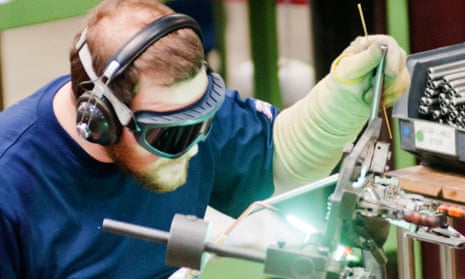Britain’s engine room of medium-sized manufacturing and service companies are more than a match for the German Mittelstand that is lauded by politicians and business leaders as the template for economic growth, according to a study by HSBC.
The UK’s “Brittelstand” of middle-market companies with a turnover of more the $50m (£33m) but less than $500m (£325m) make up 17.2% of economic activity, compared with 16.3% in Germany and 13.2% in the US, the study found.
The knock-on benefits of extra consumption and contracts with suppliers put the overall effect at 38.6% of GDP in the UK, compared with Germany’s 35.5% and 31% in the US.
The study of 15 countries found that while France’s middle-market enterprises (MME) accounted for a smaller proportion of GDP than the UK’s, the knock-on effects were greater, propelling France to the top of the league, with 39% of GDP coming from the middle-market firms.
The report, Hidden Impact – The Vital Role of Mid-Market Enterprises, commissioned by HSBC from the consultancy Oxford Economics, shows mid-market firms contribute more in terms of both growth and jobs than any other business sector.
Some studies of UK business culture have shown mid-sized companies falling behind their larger rivals following an investment drought triggered by the financial crisis. GDP figures last week showed that business investment has sunk to levels last seen in 2009.
HSBC’s UK head of corporate banking, Amanda Murphy, said the firms under review were dynamic, and made investments in new equipment, property and processes with funds generated from sales and bank loans.
She said: “UK mid-sized businesses are truly the backbone of the British economy, supporting millions of jobs and making a vital contribution to economic performance. As this study shows, the Brittelstand is among the leaders globally in terms of the support it provides the domestic economy – all too often, this contribution has been underestimated, if not hidden.
“MME businesses display huge diversity across the country, from longstanding family manufacturing firms to retail chains to dynamic R&D companies. But among the characteristics that unite them are the advantages offered by their scale – they tend to be more productive than small businesses, while also being more nimble and innovative than the largest firms. For that reason, it’s vital that all of us – from banks to [the] government – do more to understand and meet the specific needs of the sector.”
The 3.4m jobs created by MMEs in the UK represent 14.5% of private-sector employment and are on a par with France, at 14.2%, and Germany, at 14.7%.
The businesses also contribute almost twice as much to economic output as the financial services industry, and three times as many jobs.
